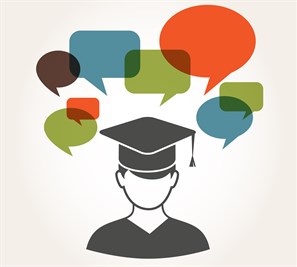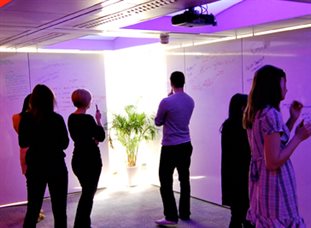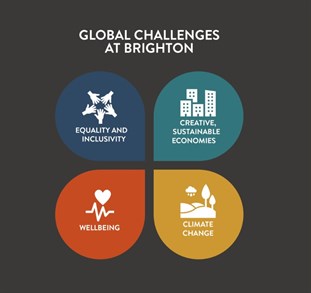Embedding sustainability
We’re striving to embed sustainability throughout all our practices. Our university’s approach to engaging students and staff is framed by the UN Sustainable Development Goals (SDGs), influencing our teaching and learning, research, public and community engagement, and campus operations, in collaboration with the Students' Union.
Sustainable curriculum
At our university, sustainability is seamlessly integrated into all teaching and learning through Research-Informed Teaching. This innovative approach combines learning with research skills and knowledge exchange, encouraging students across disciplines to explore Education for Sustainable Development (ESD). ESD in our courses and modules is reviewed through the Annual Quality Assessment process led by the quality leads of the Quality & Standards Department. ESD approaches and qualitative impact are also overseen by members of the Global Challenges Leadership Group.
Visit our Global Challenges and research and knowledge exchange pages for more insights.
Our campus serves as a 'living lab' for sustainable development, addressing Global Challenges. Our Net Zero Carbon Management strategy utilises university buildings for research and teaching, exemplified by first-year Architecture, Technology, and Engineering students exploring low-carbon retrofitting techniques. Additionally, our People and Nature Plan enhances graduate skills through real-world, paid environmental surveying opportunities, boosting employability in biodiversity conservation.

Strategy for student and staff engagement
Our strategies set clear objectives and milestones for engaging both students and staff, monitored through the Sustainability and Environmental Policy statement 2022–25 with annual updates. Regular sustainability surveys assess behaviours, awareness, and performance among university stakeholders, detailed further in our Governance and Policies.
Travel
Aligned with our Net Zero Carbon Management strategy, the university aims to shift commuter transport towards mass transit, walking and cycling. Annual travel surveys guide efforts to enhance active travel options. We also offer termly free bike maintenance sessions to support safe commuting to university.
Events
Recognising the impact of scope 3 emissions, we lead by example with various events that engage students and staff, promoting wellbeing and sustainable choices in daily life to reduce scope 3 emissions. More information can be found in our Net Zero Carbon Management strategy.
Every term we offer free bike maintenance sessions for students and staff ensuring the bikes are safe when cycling and encourage them to commute to university, our most recent in May 2024.
Staff inductions and training
During mandatory staff induction days, our sustainability team introduces new staff to our sustainability policy, responsibilities, and sustainable travel advice. We provide training and community networking opportunities to drive sustainability outcomes and uphold social responsibility.
Student-led evaluations
We encourage students to get involved in evaluations. Every year, sport and health sciences students complete the Planetary Health Report Card (PHRC); a student-led initiative where they use a metric-based tool with support from their teachers to evaluate how well planetary health is addressed in their course and institution.

Research
The University of Brighton has a long, rich and diverse history in making a transformative difference to society through research and knowledge exchange.
We aim to meet the major challenges the world faces, building a sustainable future for our planet in numerous ways:
-
across the natural and technological world by addressing aspects of climate change and biodiversity loss, investigating future green fuels and architectural practices as well as making advances in health and wellbeing;
-
in the economic and social spheres by tackling issues such as clean, accessible and affordable food and water supplies, environmental justice, housing problems, and harnessing the power of global informatics;
-
by prompting real-world change through debate or critical and cultural intervention that can surface deeper issues, consolidate communities for change, and sustain the world through cultural inclusivity, opportunity and participation.
Our work breaks boundaries, bringing together diverse disciplines, international partners and individuals from academia, industry and beyond. Through our collaborations and partnerships, we share our insights, solve practical problems and shape debate towards creating a better future for all.
Visit our research and knowledge exchange pages to find out more.

Partnership
The University of Brighton actively works with community groups and organisations to help our local communities to thrive, and to improve teaching and research. We work together to solve problems and develop working relationships that help local communities and the university in the long term.
Our Community University Partnership Programme (CUPP) creates sustainable partnerships, helps develop ideas into projects, provides start-up funding and helps networks and communities of practice develop.
The university’s award-winning Green Growth Platform supports Sussex’s thriving green sector through business support, innovation and research and development support, events, and opportunities for skills development, delivered by a team of industry experts, business advisors and university specialists.
The university's Sustainability Team support local community partnerships throughout the year on small scale projects, including Brighton and Hove Food Partnership, Surfers Against Sewage and the Brighton Bike Hub. Read more about these activities on the c-change pages.